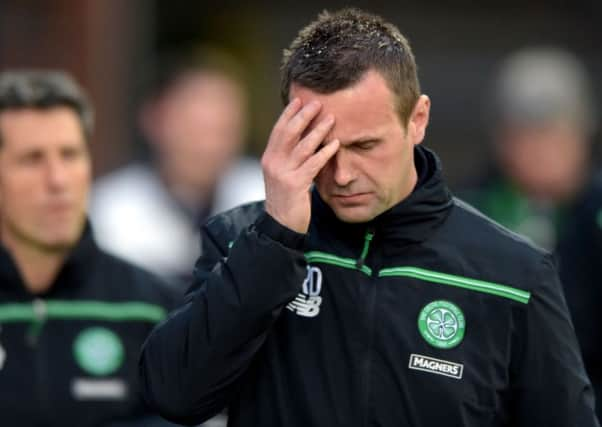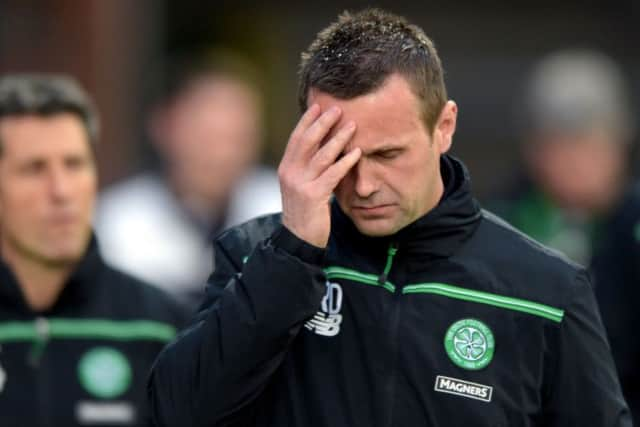Stephen Halliday: Celtic job simply too big for Ronny Deila


They were also four of the words chosen by Peter Lawwell to describe Deila’s management style and the kind of football he would bring to the club when he was appointed at the start of June 2014.
Celtic chief executive Lawwell and his boardroom colleagues, of course, are hardly the first to get it badly wrong when selecting the man for the most crucial role at any club.
Advertisement
Hide AdAdvertisement
Hide AdBut there is little doubt that their decision to select the previously unheralded Deila as Celtic’s 17th permanent manager two years ago has proved conspicuously damaging to both the financial turnover and continental credibility of the Scottish champions.
Those who questioned from day one whether Deila’s success at the relative backwater of Stromsgodset in his native Norway in any way equipped him for the challenges and relentless demands of managing Celtic have been vindicated.
Even if the 40-year-old completes his final task of retaining the Premiership title for Celtic over the next few weeks, it will be impossible to regard his tenure as much less than a calamity.
When he moves on next month, Deila will leave behind him a bloated first-team squad of players who, on recent evidence, lack both a clarity of purpose and sense of unity.


The Hampden loss to Rangers, albeit ultimately suffered by the capricious nature of a penalty shoot-out, was simply the latest in a line of far too many substandard performances in the eyes of the Celtic support.
Suspicions that Deila was out of his depth at Celtic had been aroused among many of them in the early weeks of his tenure during his first attempt to reach the group stage of the Champions League.
Celtic were simply wretched over two legs against Legia Warsaw in the third qualifying round with a 6-1 aggregate defeat almost flattering Deila’s team. But there was an unlikely reprieve as the outcome was overturned when it emerged Legia had briefly fielded an ineligible substitute in the second leg at BT Murrayfield.
Deila was unable to take advantage of the “Get out of jail” card, however, as Celtic allowed a winning position to slip away from them in the play-off round as they lost out to a moderate Maribor side.


Advertisement
Hide AdAdvertisement
Hide AdAlthough a Europa League group stage campaign delivered some excitement and qualification for the knockout phase, where Celtic competed well in losing 4-3 on aggregate to Inter Milan, Deila’s claims of progression did not bear close scrutiny.
Domestically, Deila did more or less what he had to do in that first season. After a shaky start, when ten points were dropped in their first eight league games and Celtic sat sixth in the table after a 1-0 home defeat by Hamilton in October 2014, his team finally found the necessary momentum and consistency to see off Aberdeen’s challenge.
Celtic cruised to the title by a 17-point margin in the end and also had the League Cup in their possession after a 2-0 final defeat of Dundee United. Deila missed out on a shot at the domestic treble when Celtic lost 3-2 in controversial circumstances to Inverness in the Scottish Cup semi-finals.
He had done enough to earn another shot at Champions League glory but fell short again at the start of this season.
After playing some of the best football of his reign to open up leads of 2-0 and 3-1 at home to Malmö in the play-off round, the naive loss of a stoppage-time goal in that first leg at Celtic Park was followed by a 2-0 capitulation in Sweden. Lawwell and his boardroom colleagues were left to rue another missed opportunity for £20 million of group-stage riches.
The Europa League offered scant consolation this time, Celtic finishing bottom of their group without a victory and being humbled by Norwegian minnows Molde home and away in the process.
It left Deila with an eye-wateringly poor European record as Celtic boss – just eight wins and ten defeats from his 26 ties which included the concession of a whopping 40 goals.
His determination to continue and earn a third attempt at Champions League qualification was undiminished at that stage, however, and there was a feeling he could still resuscitate his credibility in the job by winning a domestic treble.
Advertisement
Hide AdAdvertisement
Hide AdThat prospect was ended in the League Cup semi-final at the end of January with a 3-1 defeat by Ross County which was much less of a shock to many observers than it ought to have been.
If the Scottish Cup semi-final exit to Rangers was final confirmation that Deila’s race had effectively been run, the inevitability of his departure has been in the air for much of the campaign.
Celtic’s player recruitment policy under Deila had become increasingly puzzling and unproductive. Perhaps only goalkeeper Craig Gordon, effectively secured in advance of Deila’s appointment, can be regarded as an unqualified success among his permanent signings. Among the myriad loan deals struck, Jason Denayer and, to a lesser extent, John Guidetti were the hits among several misses which included Jo Inge Berget, Alexander Tonev, Mubarak Wakaso and Tyler Blackett.
This season, Celtic’s acquisition of Scott Allan has appeared pointless as he withers on the sidelines, while the length of contracts handed to strikers Carlton Cole and Colin Kazim-Richards seems to make little sense in light of their negligible contributions so far. Many Celtic fans have also become exasperated by Deila’s minimal use of Kris Commons, the club’s most creative player, over the past few months.
No-one who encountered Deila over the past two years will wish him anything but well as he moves on. He is a highly engaging, refreshingly open and instinctively decent individual. In more than 30 years of working in Scottish football, this correspondent struggles to think of a manager more widely popular among the press pack.
Hopefully, there will be greater success and professional contentment for Deila in his next job. Unfortunately, it is difficult to escape the conclusion that his current one proved simply too big for him.
